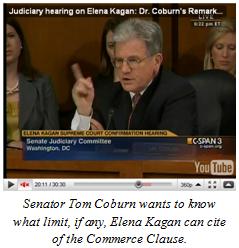By Bill Wilson
“Senator Coburn, um…” That was all Supreme Court nominee Elena Kagan could muster in response to what should have been a simple question from Oklahoma Senator Tom Coburn. He was asking of Kagan, “Do we have the power to tell people what they have to eat every day?”
It’s actually a good question.
Considering the expansive interpretation of the so-called Commerce Clause in Article I, Section 8 of the Constitution by federal courts over the past century, how Kagan interprets it could very well determine if Congress can, for example, compel individuals to eat fruits and vegetables as Coburn asked.
Notwithstanding prior case law, the Clause’s expansion (and abuse) largely began with the catastrophic Supreme Court decision rendered in 1942, Wickard v. Filburn. That ruling upheld a law that forbade an Ohio farmer from growing wheat in excess of a federal quota to feed to his cows. The excess production, said the Court, affected the price of wheat, and thus affected interstate commerce. So, Congress could prohibit it.
Once an innocuous power to regulate commerce “among the several States,” the Commerce Clause was at once transformed into an all-encompassing power for government to wield against the people. In Men in Black, Mark Levin of the Landmark Legal Foundation notes that “for the next fifty years, the Supreme Court used the commerce clause as legal justification to uphold federal intrusion into ‘just about anything.’”
In short, whatever limits once existed on the Commerce Clause disintegrated in the Filburn ruling. You name it. The environment. Guns. Energy. Health care. All manner of regulation has since fallen under this seemingly limitless umbrella.
Under ObamaCare, the doctrine has even been invoked to justify using the power of law to force individuals to purchase health insurance. After December 31st, 2013, every American will be required to carry health insurance or face a penalty.
Hence Senator’s Coburn’s question, who wanted to know whether Kagan thought Congress has the power to pass a law requiring individuals to buy and eat three fruits and three vegetables every day. Because, if she thinks that, then she sees no limit to the Commerce Clause.
The Obama Administration claims the individual mandate is constitutional. “The Commerce Clause of the Constitution does say that people need to meet certain requirements,” said Nancy-Ann DeParle, director of the White House Office of Health Care Reform, adding, “The requirement to have coverage is one of them.”
Never mind that the Commerce Clause says no such thing. To wit, it says “Congress shall have power… [t]o regulate Commerce with foreign Nations, and among the several States, and with the Indian Tribes”.
Disregard that, because Elena Kagan apparently will not pay it any heed, either.
The most she would say about the hypothetical law was that it was “dumb” and “senseless”, but that as a Justice she could not overturn it just because she thought it was so. She dodged, yes, but in the process she revealed her hand.
Kagan refused an opportunity to declare outright that it was indeed beyond the purview of the Congress’ enumerated powers to pass a law regulating what we must eat and when we have to eat it under the Commerce Clause.
Of the Clause itself she said, “the Commerce Clause has been interpreted broadly. It’s been interpreted to apply to regulation of any instruments or instrumentalities or channels of commerce, but it’s also been applied to anything that would substantially affect interstate commerce.”
Coburn replied with a potential justification that Congress might use, that eating three fruits and three vegetables every day would reduce health care costs by 20 percent. Coburn claimed the price change would affect commerce.
Therefore, under Kagan’s reading, it would be constitutional. She said, “the principles that I’ve given you are the principles that the Court should apply…” Including “anything that would substantially affect interstate commerce” in the Court’s view.
Which could be, well, just about anything. Even a law requiring folks to eat three fruits and vegetables every day. The truth is, although in testimony Kagan acknowledged some theoretical limit to the Commerce Clause — although she failed to outline it — for all intents and purposes she sees no functional limit to its use.
That is why Kagan’s nomination should have all right-thinking Americans concerned.
Bill Wilson is the President of Americans for Limited Government.


